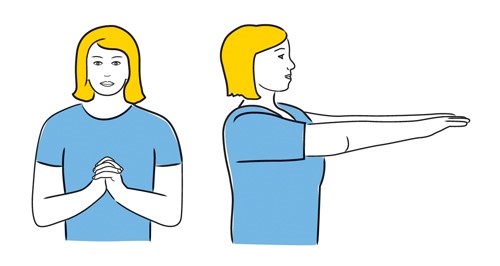It's important to exercise after breast cancer surgery
Following breast cancer surgery you may have difficulty moving your shoulder or arm. We recommend that you do regular exercise after surgery to maintain a full range of movement, speed up your recovery and prevent any long term problems in your shoulder or arm.
Simple exercise can help to:
- Relieve pain and stiffness
- Reduce swelling
- Keep movement in your arm and shoulder.
When should you start exercising?
When you are discharged from hospital your breast care nurse, physiotherapist or surgeon will advise what exercise to do and when to start. Your ability to manage exercise will be different depending on the surgery you have had and if there were any complications. For some people, post-surgical pain is a barrier to exercise so it is important to take the pain relief you have been prescribed. Other complications that may affect your ability to exercise include seroma, wound infection or cording. If you are not sure, contact your breast nurse for advice.
Exercising is most effective if you are able to find a place in your home where you can do it uninterrupted. Choose a space that is warm and relaxing. Use a chair if that helps. Relax and take the time to breath deeply and relax your muscles before beginning and at the end.
You can find post-operative exercises in this fact sheet, provided by Cancer Council Australia.
If you have had breast reconstruction we recommend you ask your surgical team what types of exercise are best for you.
Video
Exercises After Breast Cancer Surgery | Cancer Research UK
This post operative video, produced by Cancer Research UK, also provides information about how and when to do exercises. If you have any questions or concerns please contact your treatment team.
Exercise following reconstruction
Breast reconstruction surgery is more complex than breast surgery without reconstruction. Your plastic or oncoplastic breast surgeon will discuss the risks with you.
It takes time to get over surgery and you are likely to feel tired at first.
The aim of exercising after reconstructive surgery is to help you get back to your normal activities and your usual range of movement.
You will be given exercises to keep you moving and to stop you from getting too stiff or tight. These will vary depending on the type of breast reconstruction you have had.
Below are some simple tips to keep you moving gently and safely:
- Deep breathing can help you relax and ease discomfort and tightness around the surgical site. It can also help with relieving stress and anxiety.
- Sit comfortable in your chair
- Take slow, deep breaths, through your nose and let your chest and abdomen expand.
- Breathe out slowly though your mouth.
- Repeat as many times as you like.
- Take your pain relief regularly – this will help your mobility and ease discomfort.
- Wear anti-embolism stockings up to the knee until you are walking around normally to prevent blood clots developing your legs.
- Start by doing some gentle exercises like shoulder rolls and build up to full movement over a number of weeks.
- Walk short distances to begin with. This may be simply walking around at home for 10 minutes every hour during the day. Build up the time you spend walking gradually each day.
- Avoid heavy lifting or more strenuous exercise for the first four to six weeks.
This includes:- Housework like vacuuming, or hanging out the laundry
- Lifting children or pets
- Running
- Aerobics
- Weights
- Yoga (where you are stretching your arms or at risk of pulling your surgical incision site)
- Use your body as a guide. If you feel tired or achy, slow down.
- If you feel your range of movement is not progressing, talk to your surgeon or breast nurse.
Get started
When you're ready to begin your rehab journey, fill out this form and one of our specialist breast nurses will be in touch to help.
If you have any questions or need to talk things through with someone, get in touch with our specialist breast nurses. Call 0800 226 8773 or email breastnurse@bcf.org.nz

